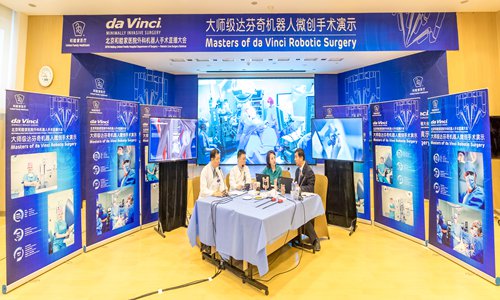
Experts explain the livestreaming robotic surgeries at the robotic live surgery seminar on May 20. Photo: Courtesy of BJU
It is the third year that Pier C. Giulianotti has been livestreaming da Vinci robotic surgery at Beijing United Family Hospital (BJU).
Giulianotti is a professor of surgery at the University of Illinois and the president of the Clinical Robotic Surgery Association (CRSA). During the broadcast, he spent over five hours performing the colectomy robotic surgery on a 62-year-old Chinese man suffering from colon cancer. By using the robotic surgical system developed by the American company Intuitive Surgical, surgeons like him can control the interactive robotic arms from a console to do complex procedures with a minimally invasive approach.
The BJU Department of Surgery - Robotic Live Surgery Seminar was held at the hospital on May 20. The theme of the seminar was "Masters of da Vinci robotic surgery." Following Giulianotti, Professor Michelle Savu, the chief of the General Surgery Department at BJU and Professor Zhang Bin, the head of the Department of Head and Neck Surgery at Peking University Cancer Hospital in Beijing, also livestreamed two other robotic surgeries - a bariatric sleeve gastrectomy and a hemithyroidecomy - at the seminar. Hundreds of thousands of people watched the broadcast.
As the first-ever surgeon to produce a significant series of complex robotic procedures and to have personally performed more than 2,000 robot-assisted surgeries in the world, Professor Giulianotti first started to livestream robot-assisted surgery in 2016 at the first BJU robotic live surgery seminar. Giulianotti said there is academic evidence showing that using the robotic surgical system, which provides more flexibility, precision and larger vision, surgeons can greatly improve their performance. Compared with open operations and laparoscope operations, there will be less blood loss, smaller surgical trauma, fewer complications, quicker recovery and patients can have a better quality of life and a higher rate of survival in the long run.
Dr. Xiao Haitao, a surgeon in the General Surgery Department at BJU, worked as Professor Giulianotti's assistant during the surgery. He recalled that during the procedure, they unexpectedly found the tumor's metastasis lymph node near the veins. If it was a traditional laparoscope operation, surgeons usually would choose to leave it to avoid a large amount of blood loss, which means that the cancer would not be radically cured during the operation. However, Professor Giulianotti chose to remove it to give the patient a better chance of survival after the surgery and completed the extraction without causing any significant loss of blood. The patient lost no more than 10 milliliters of blood. "Besides Dr. Giulianotti's excellent skills, the advantages of the robotic surgical system also played a big role in the total removal of the tumor. The da Vinci robots are like the hands of the surgeons, and they are even more flexible than human hands and have the ability to eliminate any tremor, which is very important during long surgeries," said Dr. Xiao.
Professor Giulianotti thinks that robotic surgeries have developed greatly in recent years in China. He recalled that when he first came to Beijing in 2009, there were no robotic surgeries. Now, there are over 60 da Vinci robots in China. "There are over 3,000 da Vinci robots in America. I think there is still a lot of room for growth in the Chinese market for the development [of the robotic surgical system]," said Dr. Giulianotti. "So far, around 20 percent of colon and rectum operations are completed by robotic surgeries. I think the number will further increase in the near future. Our goal is to apply robotic surgeries to all kinds of complicated procedures." Dr. Giulianotti thinks that BJU has played a leading role in promoting new robotic technology in the medical industry by continuing to livestream robotic surgeries. He said that the doctors and the teams at the hospital are very good. Livestreaming robotic surgeries can also help to train new surgeons on the use of the system in China.
Dr. Liu Jing, a chief physician of the General Surgery Department at BJU, said that since it was introduced in 2015, they have done over 200 robotic surgeries, which covered urology surgery, gastrointestinal surgery, hepatopancreatobiliary surgery, gynecology and other fields.
Professor Zhu Gang, chief of surgery at BJU, is one of the top robotic surgeons in the world for urologic surgery and routinely performs robotic urology surgery at BJU. He hosts an international urological robotic seminar at BJU each year in June. "We have reached cooperation with the University of Illinois on the promotion of technology and education and training with da Vinci robots. We also invited a dozen of experts from top hospitals in China to do robotic surgeries at the hospital," said Liu.
